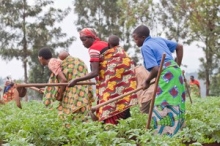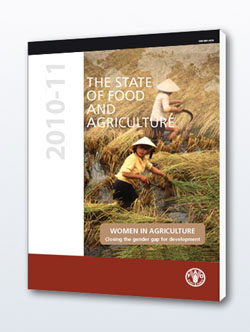
Yields on plots managed by women are lower than those managed by men, the report said. But this is not because women are worse farmers than men. They simply do not have the same access to inputs. If they did, their yields would go up, they would produce more and overall agricultural production would increase, the report said.
"The report makes a powerful business case for promoting gender equality in agriculture," said FAO Director-General Jacques Diouf.
"Gender equality is not just a lofty ideal, it is also crucial for agricultural development and food security. We must promote gender equality and empower women in agriculture to win, sustainably, the fight against hunger and extreme poverty," he added.
Closing yield gaps reaps gains for all
Just giving women the same access as men to agricultural resources could increase production on women's farms in developing countries by 20 to 30 percent. This could raise total agricultural production in developing countries by 2.5 to 4 percent, which could in turn reduce the number of hungry people in the world by 12 to 17 percent, or 100 to 150 million people. An estimated 925 million people in the world were undernourished in 2010, of which 906 million live in developing countries.
"We must eliminate all forms of discrimination against women, ensure that access to resources is more equal and that agricultural policies and programmes are gender-aware, and make women's voices heard in decision-making at all levels. Women must be seen as equal partners in sustainable development," Diouf said.
Recommended reading: Women in Agriculture - Closing the gender gap for development. Published by the FAO.

No comments:
Post a Comment